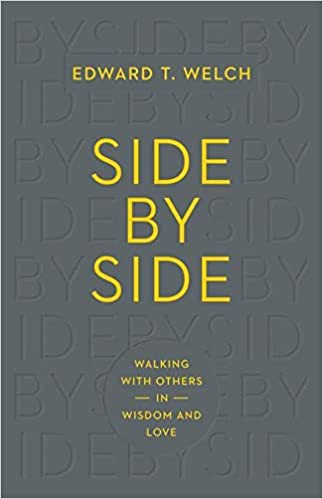Side by Side
Book Review (Edward T. Welch)
I really like this little book. It has such a beautiful and simple premise "those who help best are the ones who both need help and give help." And then "Friends are the best helpers. They come prepackaged with compassion and love. All they need is wisdom, and that is available to everyone."
One of the things that I appreciated in Noble's On Getting Out of Bed is that he both acknowledges the incredible value of professional help - therapists, counsellors, psychologists and psychiatrists. 100% agree, would heartily endorse and second that. We should work to remove the stigma around seeing a therapist, and support measures to see mental health resources provided more and more. At the same time Noble expresses that we perhaps sometimes too readily professionalise and outsource:
Although I highly recommend professional mental health services, I also think we have professionalized some of the basic life care that used to be done by mentors, parents and grandparents, older people in the church, elders, pastors, teachers, and other wise people. Our economy tends to commercialize and professionalize everything, including the most basic human interactions, such as mentorship, friendship, and discipleship. Many lesser instances of anxiety, distress, and depression could be alleviated with the loving counsel of a wise friend. We all need the loving counsel of a wise friend. Try to find one." (OGOOB p 88)
Welch in some way steps into this space, and the book has two very sensible halves. It begins by treating the topic of how to be needy - how do we recognise the needs we have for help, and then articulate them, and take those needs to God, and to other human beings. Only then does Welch consider the second half - how can we move towards the needy other and be a help to them. It is as people who need help that we are best able to help others in need.
Both the structure of the book and its contents are intelligent. So, in the first half Welch helps us understand both the difficulties of circumstances, and the dynamics of the heart, and then to put the two together to connect heart with suffering in life. He then connects these two things with our chief problem (sin) and our chief need (forgiveness), before showing us how to articulate a scripturally shaped cry to God for help, and then bringing our needs for help to other people. I particularly appreciate the way Welch shows some of the ways that the Psalms give shape to our prayers, as well as practical wisdom for asking others for help, especially prayer.
In the second half Welch takes up how to help others in need, and this is an incredibly practical book which is one of the reasons I like it. Here he begins with some conceptual material (the needed reminder that the Spirit is what makes us capable and equipped for this task), before nuts and bolts practical things - moving towards other people, how to simply greet people, have thoughtful conversations, learn to see the good in others, walk alongside them, share (both give and receive) stories, and then to the more meaty matters - helping people in their troubles, praying with them, dealing with both sin and suffering. Some of this material is the absolute bare bones of "you are at a church service. the service ends. who should you go and talk to. what should you say".
Like this, "A reasonable application of Scripture is to greet one person we don’t know or don’t know well every time we gather with others in the body of Christ." How much better would church life be if we all did this week by week? Or his section on "things not to say when people are suffering", which is great advice, like how no one wants to hear "It could be worse".
I also appreciate the section on preparing to talk about sin. In many ways it's fair easier, even if it's still hard, to talk with people about their suffering. But talking to people about sin is more challenging, but just as we need each other in the midst of suffering, we also need each other in the daily struggle to be better people, to resist evil and embrace the good. Welch doesn't rush in and doesn't advise rushing in either: humility and patience and a measured approach are the order of the day. "Sin is best raised in the context of faithful friendships where hardships have been shared and friends have prayed with each other."
The conclusion circles back to the title, and justly so. When we sit side by side with someone, rejoice with those who rejoice, weep with those who weep, struggle with those who struggle, lament with those who lament, and bring our own needy selves alongside other needy selves, this is the work of friendship.
Post-Script: I mostly write articles with a considerable lead-time before they get published here, but just today before this goes live I’ve heard from multiple friends who are wrestling, struggling, suffering in the midst of all that life throws at us. I don’t believe this is “now, more than ever”, because I think it’s always been like this. But I am reminded now as much as ever of how much we need our friends, and to be friends, to both sit and walk side-by-side through the valley of the shadow of death, as well as to sit and rejoice together at the table of the Lord’s banquet.

